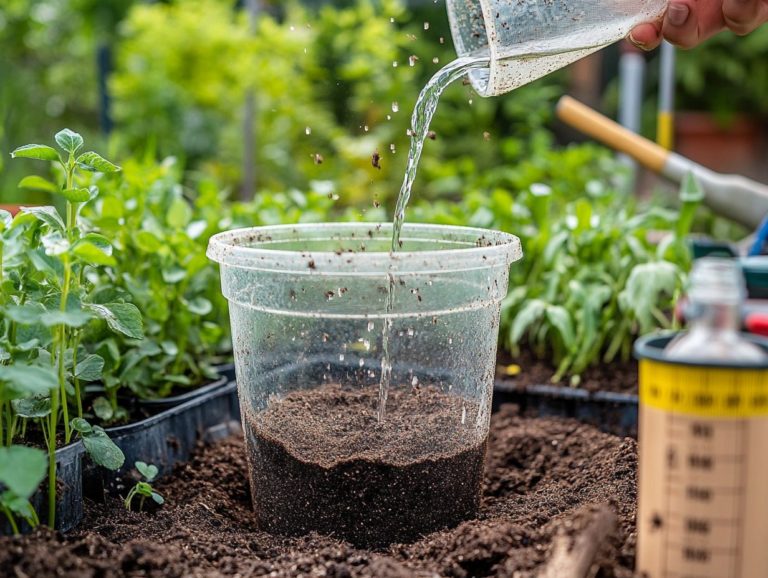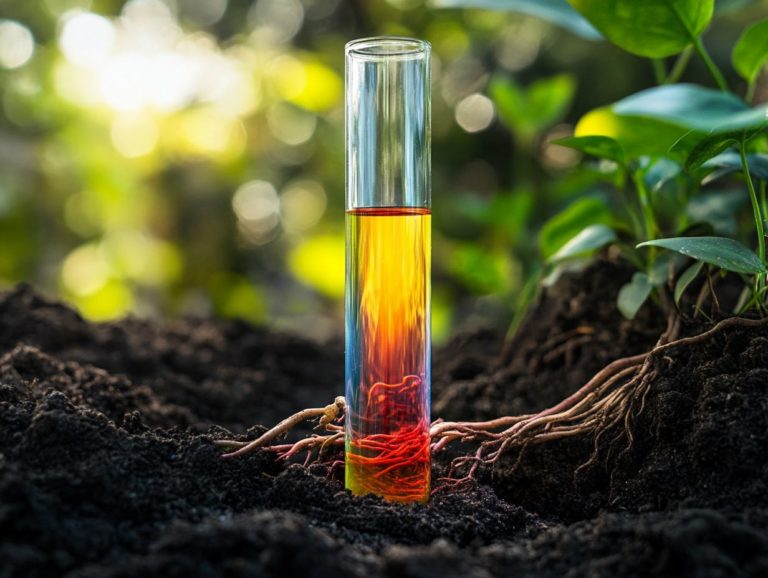5 Ways to Enhance Soil Fertility Naturally
Soil fertility stands as the cornerstone of successful farming and sustainable agriculture. As the demand for eco-friendly practices rises, you may find yourself among the growing number of farmers embracing natural methods to enhance soil health.
Get ready to discover five powerful strategies that will transform your soil health:
- Composting
- Utilizing natural fertilizers
- Practicing crop rotation
- Incorporating mulching
- Exploring intercropping
This article unpacks the true meaning of soil fertility, examines the implications of chemical fertilizers, and highlights how these natural approaches can benefit both your farming endeavors and the environment.
Uncover common myths and practical tips that can revolutionize your farming practices!
Contents
- Key Takeaways:
- 1. Composting
- 2. Using Natural Fertilizers
- 3. Crop Rotation
- 4. Mulching
- 5. Intercropping
- What Is Soil Fertility and Why Is It Important?
- How Do Chemical Fertilizers Affect Soil Fertility?
- What Are the Environmental Impacts of Using Chemical Fertilizers?
- How Can Enhancing Soil Fertility Naturally Benefit Farmers and the Environment?
- What Are Some Other Natural Methods for Improving Soil Fertility?
- What Are Some Common Myths About Enhancing Soil Fertility Naturally?
- Frequently Asked Questions
- What are the benefits of enhancing soil fertility naturally?
- What are the 5 ways to enhance soil fertility naturally?
- Why is crop rotation important for enhancing soil fertility?
- How does composting improve soil fertility?
- What are the benefits of using cover crops for enhancing soil fertility?
- Can using natural fertilizers like bone meal or fish emulsion harm the environment?
Key Takeaways:

- Composting is a natural way to enrich soil with essential nutrients and improve its structure, making it more fertile for plants to grow.
- Using natural alternatives like compost, manure, and cover crops helps maintain soil fertility while reducing environmental impacts.
- Practicing crop rotation and intercropping replenishes soil nutrients and prevents soil depletion, improving long-term soil fertility.
1. Composting
Composting is an essential practice in sustainable farming that transforms organic matter into nutrient-rich compost. This enhances soil health and supports robust plant growth. This process enriches the soil with vital nutrients and fosters the activity of tiny organisms that help the soil stay healthy.
You can compost various organic materials, from kitchen scraps and yard waste to manure. Create a balanced mix that nurtures healthy soils. Earthworms play a pivotal role in this nutrient cycling; they break down organic materials even further. Their nutrient-rich castings enhance soil structure and aeration.
Consider creating compost tea by steeping finished compost in water. This powerful soil amendment improves moisture retention and promotes beneficial microbial communities, ultimately leading to increased fertility and resilience in your crops.
2. Using Natural Fertilizers
Natural fertilizers, such as compost and animal manure, can significantly enhance your soil’s fertility and health. This approach provides your crops with essential nutrients while minimizing negative impacts on the soil ecosystem. Natural fertilizers improve soil structure and encourage the growth of beneficial microbial communities.
Compost, filled with organic matter, offers a balanced supply of nitrogen, phosphorus, and potassium. This nourishes your plants and helps retain moisture while improving soil aeration. Animal manure has a higher nitrogen content that can supercharge plant growth, but it s essential to use it judiciously to prevent nutrient runoff.
Testing your soil composition is vital for pinpointing specific nutrient deficiencies. This allows you to fine-tune your fertilizer application effectively. By emphasizing organic fertilizers, you support sustainable farming practices that cultivate healthier soils, resulting in more robust crops without relying on synthetic additives.
3. Crop Rotation
Crop rotation is an essential agricultural practice that significantly enhances soil health. It fosters biodiversity and optimizes nutrient levels, boosting your crop yield and minimizing pest pressure. By rotating your crops, you can effectively disrupt the cycles of pests and diseases while improving soil structure and fertility.
This approach lessens your reliance on chemical fertilizers and promotes the growth of beneficial microbes that enrich the soil even further. For example, leguminous crops play a pivotal role in nitrogen fixation, replenishing essential nutrients in the soil after a season of cultivation.
By implementing a variety of crop types, you create a balanced ecosystem where natural predators flourish. This offers a sustainable method of pest management. Rotating different crops each season can also help mitigate the spread of soil-borne pathogens, ensuring healthier plants and leading to more robust harvests.
Act now and start today to rejuvenate your soil! Watch your crops thrive!
4. Mulching

Mulching involves applying a layer of organic or inorganic material to the soil surface. It significantly enhances soil structure.
This technique not only helps retain moisture but also suppresses weed growth and prevents nutrient leaching. It s a straightforward yet incredibly effective method for maintaining a healthy soil ecosystem, creating optimal conditions for plant roots.
Choosing the right type of mulch is crucial for maximizing benefits. Organic mulches, like wood chips and straw, improve moisture retention and enrich the soil as they break down, fostering beneficial microbial activity.
On the other hand, inorganic options like rubber or gravel may not add nutrients, but they excel in longevity and weed control. When selecting mulch, consider factors such as your climate, the types of plants you re growing, and the overall aesthetics of your garden.
Consistent application and maintenance of mulch can effectively curb weed growth, ensuring that your plants have unfettered access to the vital resources they need to thrive.
5. Intercropping
Intercropping allows you to grow two or more crops close together. This practice enhances biodiversity and improves soil health.
It boosts overall crop yield while managing pests more effectively. By promoting synergistic relationships between crops, you can optimize the use of soil nutrients, maximizing benefits for plant roots.
For example, the combination of maize and beans reduces weed pressure and enhances nutrient uptake. This pairing attracts beneficial insects, naturally controlling pest populations.
This technique not only improves soil fertility through diverse root systems but also leads to healthier crops and greater production levels. As you adopt these strategies, you’ll likely notice enhanced yields alongside a more resilient agricultural ecosystem.
What Is Soil Fertility and Why Is It Important?
Soil fertility is your secret weapon for agricultural success. It reflects the soil’s ability to deliver essential nutrients to plants.
This vital aspect not only influences agricultural productivity but also upholds environmental sustainability.
Healthy soil brimming with organic matter fosters a rich microbial ecosystem, which plays a crucial role in nutrient cycling and achieving optimal crop yields. This makes soil fertility a cornerstone of sustainable farming practices.
Maintaining soil health is essential for food system viability. It directly influences plant growth and agricultural yields.
Key components of soil fertility encompass important nutrients like nitrogen, phosphorus, and potassium, alongside small but vital nutrients like iron and manganese, all of which are critical for robust plant development.
Vibrant microbial activity enhances nutrient availability and aids in breaking down organic material, further enriching the soil.
By assessing indicators like soil pH, organic matter content, and nutrient levels, you can effectively monitor soil quality.
This knowledge enables you to make informed decisions that not only support sustainable practices but also mitigate the adverse effects of agricultural intensification.
How Do Chemical Fertilizers Affect Soil Fertility?
Chemical fertilizers can enhance soil fertility by delivering immediate nutrient boosts. However, they also have potential long-term consequences, such as nutrient runoff and a decline in soil health. Relying too heavily on these fertilizers can change soil pH and properties, which may compromise the soil’s ability to support future crops.
While these synthetic formulations may provide a short-term increase in crop yields, they often disrupt the delicate balance of soil ecosystems. The microbial activity essential for breaking down organic matter and cycling nutrients tends to diminish with continuous chemical application. This creates a nutrient imbalance that can hinder plant growth. As a farmer, you might find yourself caught in a cycle of dependency, requiring larger amounts of fertilizers to achieve the same results.
To navigate these challenges, it is crucial to explore sustainable alternatives, such as organic compost or cover cropping. These practices ensure the long-term health and resilience of your agricultural methods.
What Are the Environmental Impacts of Using Chemical Fertilizers?

The use of chemical fertilizers poses significant environmental challenges. Nutrient runoff into waterways can lead to water supply contamination, which jeopardizes aquatic ecosystems. The production and application of these fertilizers can harm air quality by releasing greenhouse gases, which are gases that trap heat in the atmosphere.
These pollutants contribute to algal blooms, which deplete oxygen in lakes and oceans. This creates dead zones that devastate marine life. Over-reliance on chemical inputs can degrade soil health, reducing its fertility over time and increasing erosion. This cycle diminishes agricultural productivity and fosters a dependency on even more chemicals.
It’s essential to embrace sustainable practices. Techniques like organic farming, crop rotation, and integrated pest management can effectively mitigate these environmental impacts while promoting a healthier ecosystem. By adopting these methods, you can achieve positive outcomes for both your crops and the environment!
How Can Enhancing Soil Fertility Naturally Benefit Farmers and the Environment?
Enhancing soil fertility naturally through sustainable farming practices offers numerous benefits for both you and the environment. By embracing these methods, including techniques to improve soil fertility, you can improve soil health, boost biodiversity, and achieve higher crop yields all while maintaining ecological integrity.
Utilizing techniques like composting and cover cropping allows you to cultivate resilient ecosystems that support long-term agricultural productivity. These practices replenish essential nutrients and enhance soil structure and water retention, making farming operations more efficient and less reliant on synthetic fertilizers.
By composting, you recycle organic waste into a nutrient-rich soil amendment that promotes microbial activity. Cover cropping acts as a protective shield against erosion and helps manage weeds effectively.
Incorporating organic amendments, such as green manures, can elevate soil fertility further. This approach allows you to reduce costs related to chemical inputs and ultimately increase your profit margins. This holistic strategy nurtures the environment while paving the way for a prosperous future for agricultural producers like yourself.
Start incorporating organic methods into your farming practices and witness the benefits firsthand!
What Are Some Other Natural Methods for Improving Soil Fertility?
Other natural methods for enhancing soil fertility include the strategic use of cover crops, composting, and crop rotation. Implementing these practices alongside 5 ways to improve soil structure not only improves soil health and biodiversity but also boosts nutrient availability.
These methods replenish essential soil nutrients and promote a vibrant community of good bugs in the soil, which is vital for sustainable agriculture, including proper weed management.
Implementing cover crops like clover or rye enhances soil structure and curbs erosion. Composting introduces a rich mix of organic matter and microorganisms that enrich the soil.
Crop rotation disrupts pest cycles and enhances nutrient uptake through the alternation of deep and shallow-rooted plants. Each of these methods works in harmony, creating an ecosystem where beneficial organisms thrive.
Embracing these techniques allows you to increase productivity while fostering resilience within the agricultural system. This ultimately contributes to healthier food supplies and a more sustainable environment.
What Are Some Common Myths About Enhancing Soil Fertility Naturally?
Several prevalent myths surround the enhancement of soil fertility through natural means, often leading to misconceptions about the effectiveness and practicality of these methods in sustainable farming. Understanding these myths is essential for you as a farmer seeking to improve soil health through meticulous organic matter and nutrient management.
You might have heard that natural soil fertility methods take ages to yield results or that they pale in comparison to synthetic fertilizers. However, research indicates that while these natural practices may demand a bit of patience, they ultimately foster a more robust soil ecosystem over time.
It’s easy to assume that organic amendments work universally, but personalized applications based on soil tests and specific crop requirements can deliver significantly better outcomes.
By wholeheartedly embracing sustainable practices, you not only boost your immediate yields but also strengthen the land against erosion and nutrient depletion, ensuring that agricultural viability is preserved for future generations.
Frequently Asked Questions

What are the benefits of enhancing soil fertility naturally?
Enhancing soil fertility naturally can result in healthier plants, increased crop yields, better water retention, improved soil structure, and reduced need for chemical fertilizers. Exploring ways to promote soil health in urban areas can also highlight the benefits of using organic fertilizers as alternatives.
What are the 5 ways to enhance soil fertility naturally?
The 5 ways to improve soil biodiversity naturally are crop rotation, composting, cover crops, mulching, and using natural soil amendments like bone meal or fish emulsion, which often include essential elements such as nitrogen, phosphorus, and potassium.
Why is crop rotation important for enhancing soil fertility?
Crop rotation can help prevent nutrient depletion and reduce the risk of pests and diseases, which in turn leads to healthier and more fertile soil, ensuring better plant roots growth.
How does composting improve soil fertility?
Composting adds organic matter to the soil. This provides essential nutrients, improves soil structure, retains moisture, and encourages beneficial microbial activity.
What are the benefits of using cover crops for enhancing soil fertility?
Cover crops add nutrients to the soil, improve soil structure, prevent erosion, and suppress weeds. They attract beneficial insects and help break up hard soil.
Can using natural fertilizers like bone meal or fish emulsion harm the environment?
No, using natural fertilizers can boost your soil’s health without harming the environment. These eco-friendly options are derived from natural sources and help maintain a thriving soil ecosystem.






